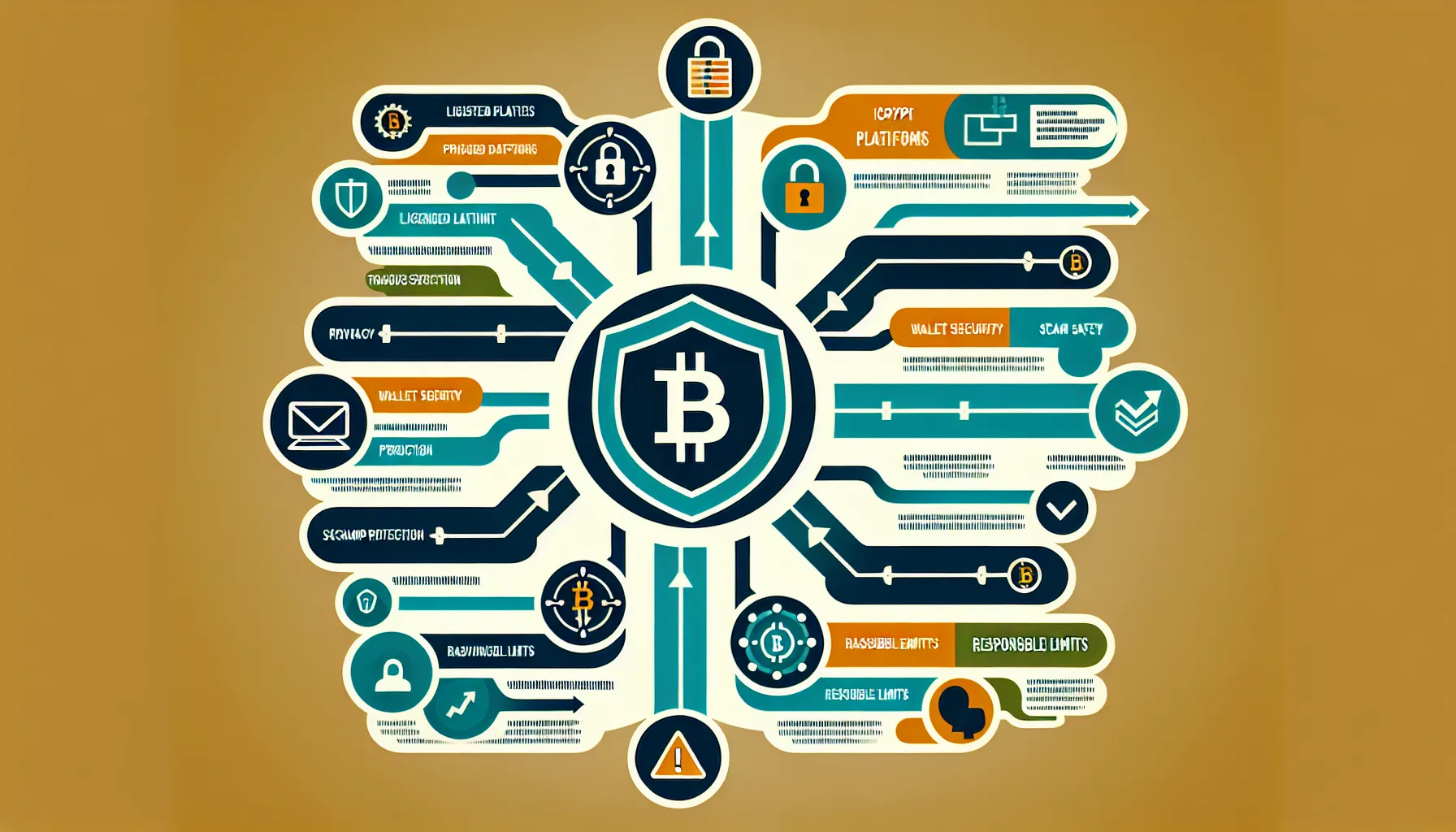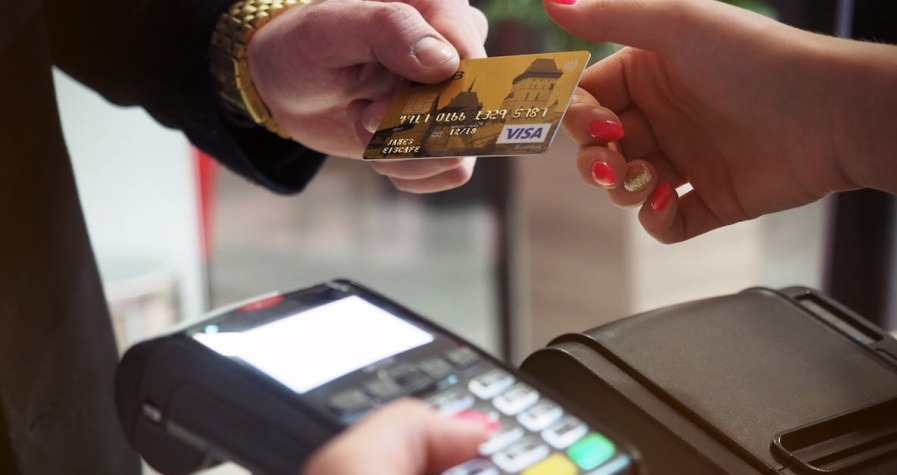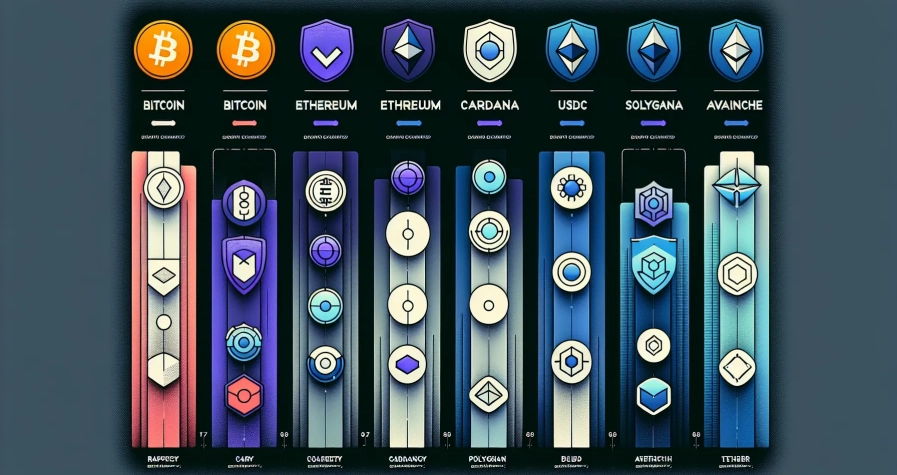The rise of cryptocurrency casinos has transformed online gambling, offering players enhanced privacy, faster transactions, and access to innovative gaming experiences. Yet, the same features that make crypto casinos appealing, decentralisation, pseudonymity, and limited regulatory oversight, can also expose users to unique risks. From unregulated platforms and sophisticated scams to wallet security breaches, navigating this space requires more than just luck.
Understanding how to protect oneself isn’t optional in the crypto casino world: it’s essential. Whether someone is a seasoned player or just exploring blockchain-based gaming, knowing the right safety measures can mean the difference between enjoying secure entertainment and falling victim to fraud or loss. This guide outlines practical, proven strategies to help users stay safe whilst engaging with crypto casinos, covering everything from choosing reputable platforms to protecting digital assets and personal information.
Key Takeaways
- Choosing licensed and regulated crypto casinos with provably fair technology is the foundation of safe gambling and protects against fraud.
- Securing your cryptocurrency wallets with hardware storage for large amounts and enabling two-factor authentication prevents irreversible fund losses.
- Always verify a casino’s licensing credentials directly with the issuing authority and check for transparent ownership information before depositing funds.
- Recognising phishing attempts and unrealistic bonus offers helps you avoid sophisticated scams targeting crypto casino users.
- Setting responsible gambling limits and monitoring your transactions regularly ensures you stay safe whilst using crypto casinos and maintain control over your spending.
- Using strong, unique passwords with a password manager and reviewing privacy policies minimises the risk of data breaches and unauthorised access to your accounts.
Choose Licensed and Regulated Crypto Casinos

The foundation of safe crypto gambling begins with selecting a legitimate, trustworthy platform. Not all crypto casinos operate under the same standards, and the absence of proper licensing can leave players vulnerable to unfair practices, withheld winnings, or outright fraud. Whilst the decentralised nature of cryptocurrency might suggest a lawless landscape, reputable operators voluntarily seek licensing from recognised gambling authorities to demonstrate their commitment to fair play and player protection.
Verify Licensing Credentials
Before depositing any funds, players should investigate a casino’s licensing status thoroughly. Legitimate crypto casinos typically display their licence information prominently in the website footer or an “About Us” section. Recognised licensing jurisdictions for crypto casinos include Curaçao, Malta Gaming Authority, and the UK Gambling Commission (though UK-licensed sites face stricter cryptocurrency restrictions). To verify authenticity, users can cross-reference the licence number directly with the issuing authority’s database, a step that takes minutes but provides invaluable peace of mind.
It’s worth noting that some crypto casinos operate in grey regulatory areas. Whilst this doesn’t automatically signal danger, it does require extra caution. Players should look for additional trust indicators: established operational history, positive user reviews across multiple platforms, and transparent ownership information. If a casino provides no verifiable regulatory details or deliberately obscures this information, it’s best avoided altogether.
Check for Provably Fair Technology
One of cryptocurrency gambling’s most significant innovations is provably fair technology, a cryptographic system that allows players to independently verify the fairness of each game outcome. Unlike traditional online casinos where users must simply trust the operator, provably fair systems use blockchain technology and cryptographic algorithms to create transparent, verifiable randomness.
When a game is provably fair, the casino generates a random server seed (kept secret until after the bet), combines it with a client seed (which players can influence), and produces a game result that can be verified afterwards using hash functions. Reputable crypto casinos provide tools that let users check these calculations themselves, ensuring no manipulation occurred. Players should actively look for this technology and, ideally, spot-check a few game results to confirm the system works as advertised. The presence of provably fair technology doesn’t just protect against dishonest operators, it represents a fundamental shift towards transparency in online gambling.
Secure Your Cryptocurrency Wallets
A crypto casino can’t steal funds from a wallet it doesn’t control, which is precisely why wallet security forms such a critical component of safe gambling. Unlike traditional payment methods with built-in fraud protection and chargeback options, cryptocurrency transactions are irreversible. Once funds leave a wallet, recovery is virtually impossible without the recipient’s cooperation. This permanence makes robust wallet security non-negotiable.
Use Hardware Wallets for Large Amounts
For anyone holding significant cryptocurrency intended for gambling (or any purpose), hardware wallets represent the gold standard of security. These physical devices store private keys offline, immune to the malware, keyloggers, and remote hacking attempts that compromise software wallets. Popular options like Ledger and Trezor keep assets in “cold storage,” requiring physical confirmation before any transaction proceeds.
The recommended approach involves maintaining two wallets: a hardware wallet for storing the bulk of one’s cryptocurrency, and a separate “hot wallet” (software-based) for active gambling sessions. Users transfer only what they intend to wager from the secure hardware wallet to the hot wallet, limiting exposure if the hot wallet becomes compromised. This separation creates a firewall between one’s primary holdings and the inherently riskier online environment. Yes, it adds an extra step, but that inconvenience pales compared to the devastation of losing one’s entire cryptocurrency portfolio.
Enable Two-Factor Authentication
Two-factor authentication (2FA) adds a critical second layer of security beyond passwords. When enabled, accessing a wallet or casino account requires both something the user knows (password) and something they possess (typically a time-sensitive code from an authentication app). This dramatically reduces the risk of unauthorised access, even if a password becomes compromised through phishing or data breaches.
Users should enable 2FA on every account that supports it, their cryptocurrency wallets, casino accounts, and associated email addresses. Authenticator apps like Google Authenticator or Authy offer superior security to SMS-based 2FA, which can be vulnerable to SIM-swapping attacks. During setup, it’s essential to securely store any backup codes provided: these allow account recovery if the authentication device is lost. Some users photograph these codes and store them in a secure, encrypted location separate from their devices. The few seconds 2FA adds to the login process represent a minuscule price for substantially enhanced security.
Protect Your Personal Information
Cryptocurrency’s promise of anonymity attracts many to crypto casinos, yet most platforms still collect some personal data, particularly those implementing Know Your Customer (KYC) procedures to comply with anti-money laundering regulations. The challenge lies in balancing regulatory requirements with personal privacy, sharing only what’s necessary whilst protecting sensitive information from misuse or breaches.
Review Privacy Policies
Before registering with any crypto casino, users should actually read the privacy policy, yes, that document everyone typically scrolls past. This policy reveals what data the casino collects, how it’s used, with whom it’s shared, and where it’s stored. Red flags include vague language about data sharing with “partners,” storage in jurisdictions with weak data protection laws, or policies that claim ownership over user-generated content beyond reasonable operational needs.
Reputable casinos clearly outline their data practices and specify security measures like encryption protocols for data transmission and storage. They’ll detail users’ rights about their data, including access, correction, and deletion requests. If a privacy policy is conspicuously absent, buried, or incomprehensible even by legal document standards, that’s reason enough to look elsewhere. GDPR-compliant casinos (those serving European customers) generally maintain higher privacy standards, regardless of where a player resides.
Limit Data Sharing
The principle of minimal disclosure should guide every interaction with crypto casinos. Users should provide only the information explicitly required for account creation and, if necessary, KYC verification. There’s no legitimate reason to share excessive personal details beyond what’s needed for identity confirmation and regulatory compliance.
When KYC verification becomes necessary, players can take protective measures: use documents that show only required information, potentially redacting irrelevant details (whilst ensuring critical elements remain visible and the document remains valid for verification purposes). Consider using a dedicated email address specifically for gambling activities, separating this from primary personal or professional email accounts. This compartmentalisation limits the impact if a casino’s database suffers a breach. Also, users should decline optional marketing communications and carefully review any requests for supplementary information, questioning whether such requests serve legitimate purposes or represent unnecessary data collection.
Recognise and Avoid Scams
The crypto casino space, like cryptocurrency more broadly, attracts its share of fraudsters seeking to exploit less experienced users. Scams range from sophisticated social engineering attacks to blatant fraud, and recognising these threats requires both vigilance and scepticism. The old adage applies doubly in this context: if something seems too good to be true, it almost certainly is.
Spot Phishing Attempts
Phishing attacks targeting crypto casino users have become increasingly sophisticated, often mimicking legitimate casino communications with remarkable accuracy. These fraudulent messages typically arrive via email, direct message on social platforms, or even text message, claiming urgent account issues, verification requirements, or exclusive opportunities that require immediate action.
Genuine communications from legitimate casinos will never request sensitive information like passwords, private keys, or seed phrases via email or message. They won’t create artificial urgency demanding immediate credential disclosure. Users should independently verify any supposedly urgent communications by navigating directly to the casino website (typing the URL manually, not clicking links) and checking their account or contacting support through official channels. Examining sender addresses closely often reveals subtle misspellings or domain variations that distinguish fraudulent messages from authentic ones. When in doubt, assume it’s a scam until proven otherwise, genuine casinos understand security-conscious players and won’t penalise cautious verification.
Beware of Unrealistic Bonus Offers
Crypto casinos compete aggressively for players, and bonus offers represent a primary marketing tool. Legitimate bonuses can provide genuine value, but scammers exploit players’ desire for free money by advertising impossibly generous offers that serve as bait for fraud. A supposed “500% deposit bonus with no wagering requirements” or “guaranteed winning system” should trigger immediate scepticism.
Players should research any casino offering extraordinary bonuses, checking independent reviews and community discussions on platforms like Reddit or dedicated gambling forums. Legitimate casinos attach reasonable terms to bonuses, typically wagering requirements between 20x and 40x the bonus amount. Anything significantly outside this range, or bonuses with deliberately obscure terms hidden in impenetrable legal language, warrant extreme caution. Before depositing funds based on a promotional offer, users should read the complete terms and conditions, understanding exactly what’s required to actually withdraw any winnings. Some scam casinos create technically impossible withdrawal conditions, ensuring players can never actually access their funds or winnings. A few minutes of due diligence can prevent costly mistakes.
Set Responsible Gambling Limits
Safety in crypto casinos isn’t solely about protecting against external threats: it also means protecting oneself from the risks inherent in gambling itself. The same features that make cryptocurrency transactions convenient, speed, ease, and pseudonymity, can help problematic gambling behaviour if users don’t establish firm boundaries.
Responsible gambling starts with honest self-assessment and predetermined limits. Before beginning any gambling session, users should decide exactly how much they’re willing to lose, and critically, can afford to lose, treating this amount as entertainment spending rather than investment. Many reputable crypto casinos offer built-in responsible gambling tools: deposit limits, loss limits, session time reminders, and self-exclusion options. Utilising these features proactively demonstrates wise judgment, not weakness.
The cryptocurrency element adds a particular challenge: volatile prices can distort one’s perception of value. Someone might think in terms of 0.01 BTC rather than recognising the substantial fiat value that represents. Converting crypto amounts to one’s local currency provides necessary perspective. Also, the blockchain’s transparency means every transaction creates a permanent record: periodically reviewing one’s gambling activity through wallet transaction history can reveal patterns that might otherwise go unnoticed.
Players should also recognise warning signs of problematic gambling: chasing losses, gambling with money needed for essential expenses, neglecting responsibilities or relationships, or feeling anxious or irritable when not gambling. Resources like GamCare, BeGambleAware, and Gamblers Anonymous provide confidential support for anyone concerned about their gambling behaviour. The best security measure sometimes means stepping away from the casino entirely.
Use Strong Passwords and Security Practices
Passwords represent a fundamental security component, yet they’re frequently the weakest link in users’ defences. Weak, reused, or predictable passwords essentially leave doors unlocked, inviting unauthorised access regardless of other security measures in place. For crypto casino accounts, which connect directly to valuable cryptocurrency, password security deserves particular attention.
Strong passwords should be long (minimum 12-16 characters), combining uppercase and lowercase letters, numbers, and special characters in non-obvious patterns. They shouldn’t contain personal information like birthdays, names, or common words easily guessed or found through social media. More importantly, every account requires a unique password. Reusing passwords across multiple sites means that one data breach compromises every account sharing that password, a domino effect that’s devastated countless users.
Managing dozens of complex, unique passwords might seem impossible without password managers, software applications designed precisely for this purpose. Services like Bitwarden, 1Password, or KeePass generate cryptographically strong passwords and store them in encrypted vaults accessible with a single master password. This approach combines convenience with security, eliminating the temptation to reuse passwords or write them down in insecure locations.
Beyond passwords, users should regularly update software, including operating systems, browsers, and any cryptocurrency wallet applications. Updates frequently patch security vulnerabilities that attackers exploit. Public Wi-Fi networks, whilst convenient, pose risks for accessing crypto casinos or managing wallets: anyone conducting sensitive financial transactions should use secure, private networks or VPN services that encrypt internet traffic.
Monitor Your Transactions Regularly
Vigilant monitoring serves as both a preventative measure and an early warning system, enabling users to spot suspicious activity before small security compromises escalate into major financial losses. The blockchain’s transparent nature actually facilitates this monitoring, providing detailed, immutable transaction records for anyone who takes time to review them.
Players should make transaction review a regular habit, ideally after each gambling session, but at minimum weekly for active users. This involves checking both casino account activity and cryptocurrency wallet transactions, verifying that every deposit, withdrawal, win, loss, and fee matches one’s actual activity. Unfamiliar transactions, even small ones, deserve immediate investigation. Criminals sometimes test compromised accounts with minor withdrawals to verify access before attempting larger thefts.
Most cryptocurrency wallets and blockchain explorers allow users to set up transaction alerts, sending notifications whenever funds move in or out of an address. Enabling these alerts means suspicious activity triggers immediate awareness rather than going unnoticed until a routine check. For casino accounts, users should regularly review login history when this information is available, watching for access from unfamiliar locations or devices that might indicate unauthorised account use.
This monitoring extends to tracking one’s overall gambling financial picture: total deposited versus withdrawn, net gains or losses over time, and whether gambling spending aligns with predetermined budgets. This financial awareness supports both security and responsible gambling objectives. Documentation also proves valuable if disputes arise with casinos: detailed records of transactions and communications strengthen one’s position substantially.
Conclusion
Crypto casinos offer exciting opportunities, blending cutting-edge technology with entertainment, but these benefits come with responsibilities. Safety in this space isn’t achieved through a single action but through layered defences: choosing regulated platforms with provably fair technology, securing wallets with hardware storage and two-factor authentication, protecting personal information, maintaining scepticism towards potential scams, implementing responsible gambling limits, employing strong passwords, and monitoring transactions vigilantly.
The decentralised nature of cryptocurrency means users bear greater personal responsibility for their security than in traditional banking. There’s no customer service number to call for transaction reversals, no fraud protection department to reimburse stolen funds. This reality shouldn’t deter participation, it should inspire diligence. By implementing the strategies outlined here, players significantly reduce their risk exposure whilst maintaining the privacy and convenience that drew them to crypto casinos initially. Security and enjoyment aren’t mutually exclusive: they’re complementary elements of a sustainable, positive crypto gambling experience.
Frequently Asked Questions
What is provably fair technology in crypto casinos?
Provably fair technology is a cryptographic system that allows players to independently verify the fairness of each game outcome using blockchain technology. It combines server and client seeds with hash functions to create transparent, verifiable randomness that cannot be manipulated by the casino operator.
How do I verify if a crypto casino is licensed and legitimate?
Check for licence information displayed in the website footer or ‘About Us’ section. Cross-reference the licence number directly with the issuing authority’s database, such as Curaçao, Malta Gaming Authority, or UK Gambling Commission. Also look for positive reviews and transparent ownership information.
Should I use a hardware wallet for crypto casino gambling?
Yes, hardware wallets like Ledger or Trezor offer the best security for storing significant cryptocurrency amounts. Maintain two wallets: a hardware wallet for bulk storage and a software ‘hot wallet’ for active gambling, transferring only what you intend to wager.
Can I remain completely anonymous when using crypto casinos?
Whilst cryptocurrency offers enhanced privacy, most reputable crypto casinos implement Know Your Customer (KYC) procedures to comply with anti-money laundering regulations. This typically requires some identity verification, though the level varies depending on the casino’s licensing jurisdiction and operational policies.
What are common red flags of crypto casino scams?
Warning signs include unrealistic bonus offers (such as 500% with no wagering requirements), absent or vague privacy policies, no verifiable licensing information, phishing attempts requesting passwords or private keys, and withdrawal terms that are deliberately impossible to meet.
Why are cryptocurrency transactions irreversible, and how does this affect safety?
Cryptocurrency transactions are recorded permanently on the blockchain and cannot be reversed without the recipient’s cooperation. Unlike traditional payment methods with chargeback options, this permanence makes wallet security and careful transaction verification absolutely essential to prevent irretrievable losses.









